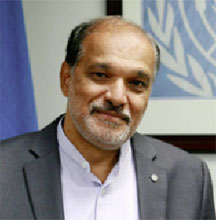By Pushpa Balgobin
in Paramaribo, Suriname
Agriculture development is directly tied to incentive-based training, according to Dr John R Deep Ford, the Food and Agriculture Organisation (FAO) Coordinator for the Caribbean.
Ford said that the Guy-ana School of Agriculture was a “classic example” of an institution, which was being underutilised in advancing agriculture at the family level. He said “take the Guyana School of Agriculture. Let me give you a classic example, a person goes to the Guyana School of Agriculture or any school of agriculture…when they graduate what they get is a certificate. The certificate goes on the wall. When they graduate they should get 25 acres of land and when they enter they should know that this is what they are going to get. They are going to pay more attention. They are going to be planning for it, they are going to be ready for it when they come out to go and farm.”
He lamented, “we don’t train people to go and farm we train people to go and advise farmers,” while speaking to the media at the opening seminar of the Caribbean Week of Agriculture being hosted at the Paramaribo, Suriname Chamber of Commerce.

Ford emphasised that succession planning had to be the responsibility of the family unit. He said that it was normal for family farms to think on a small scale with the goal to send their children to school with no intention of growing the farm.
The FAO representative stated that education and land availability went side by side and that Guyana’s and the region’s historical plantation economies still had detrimental effects on issues pertaining to land ownership at present.
Ford, a national of Guyana, told members of the media that ownership issues would continue to be a problem unless countries address the need of small-scale farmers to access credit. He said that 90% of farmers did not think of farming as profit making, highlighting that they are unsure if they can reap the harvest.
During his opening presentation of the Caribbean Week of Agriculture, which focuses on transforming family farming, he said that building on succession was a “critical dimension.”
Ford noted that family farming was the least preferred option and across the region less than 25% of family farms were depending on small-scale farming as the primary source of their livelihood.
He said that unfortunately the approaches have been technological and in the same breath the structured pricing that was prevalent prior to the 1980s was abandoned and so in turn the family farms were systemically neglected.
He said that education and public policy have been one of the systemic deterrents to agriculture development and this has been the case across the region since the 1980s.
He said that any different policies that were conceptualised and implemented needed to work concurrently with registration. Ford said that without registration it was not possible for the system to know how to best assist small-scale and medium-scale farmers.
The agriculture expert noted that moving forward crop insurance paired with registration could allow for subsidies of 85% for small-scale and family farmers and 50% for medium-scale farmers. He said that registration would comprehensively provide information on who needed assistance and how much. He highlighted that target-based policy implementation was the most successful because it was needs based.
Ford stated in his presentation that while only 30% of small farm holders will be successful, the reality was that 10-acre farms functioned more efficiently resource-wise than a 100-acre farm. He said that family farms were stewards of the earth and that more money needed to go into research institutions to promote the small-scale farming on a succession basis.




